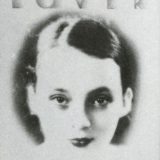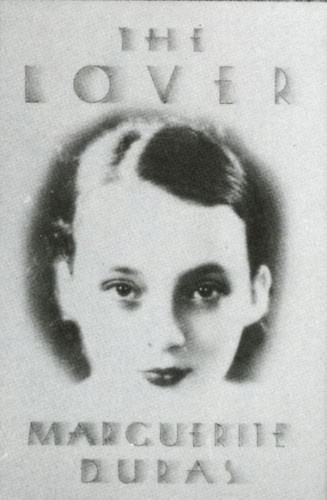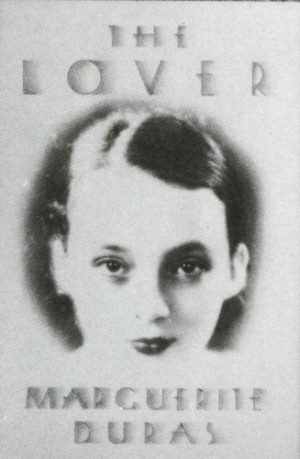The Lover – Marguerite Duras – 1984
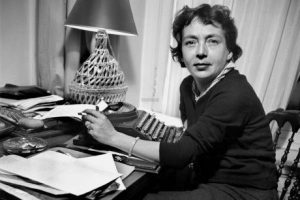
Posted by Joffre on 23/8/2010, 22:26:52
I like the tone of The Lover. I sometimes say that of books, but this time I actually do have a descriptive word. I find the tone intimate.
This is the only Duras book I’ve read. I first read it for a class at my university. I’ve somehow gotten the impression that Duras writes about the same thing all the time. Now that I write that, it sounds like a silly complaint. Jane Austen did that wonderfully.
I’m interested to hear Steven’s feelings about The Ravishing of Lol Stein. If I were to read another Duras novel, that would be my choice – for no particular reason.
~
Posted by Steven on 24/8/2010, 9:27:41, in reply to “Re: The Lover”
I read The Lover several years ago, and was planning on re-reading it now, but may not do so. I’m doing a lot of background reading for a trip next month, and it’s very unlikely that I will be able to re-read Invisible Man either.
Here are some comments on the other works by Duras that I have recently read:
The Ravishing of Lol Stein – A dark and moody piece about a woman, Lol, who is publicly jilted at her engagement party. She becomes mentally unbalanced and withdrawn, and eventually becomes a voyeur. We are watching her watch someone else–a typical very cinematic element of the nouveau roman. Unusual shifts between first and third person narration. Set in England.
The Vice-Consul – Set mostly in English-occupied Calcutta but with some memorable description of an outcast girl’s journey through Indochina. The principal character is Anne-Marie Stretter, the woman Lol Stein’s fiancé ran away with. The novel consists mostly of dinner parties where dissipated, alcoholic colonial officials complain about the heat and maneuver to become Anne-Marie’s next lover. Also very cinematic, with anonymous offstage whispers. The gossip gives us different versions of each character’s past, and it is up to the reader to imagine the truth.
Destroy, She Said – At a sanitarium in rural France, several people begin approaching a solitary woman. The woman has very conventional bourgeois attitudes toward husband and family, even as her marriage is failing, and for this reason the other set out to “destroy” her. An interview with Duras in the appendix shows that at this time (1968) her politics were very Maoist, and she was promoting the idea that our entire civilization must be destroyed so it can be reborn with a new set of values. The interview also shows that her energies were going more into film-making than writing, and she viewed this novel as little more than a preparatory sketch.
Four Novels – This is a set of four novellas from the 1950s, including her earliest works in print. They are quite good, and probably her second best works after The Lover. “The Square” is much like “Waiting for Godot.” “Moderato Cantabile” is a story of sexual frustration. “10:30 on a Summer Evening” is a Hemingwayesque story of an alcoholic woman, on vacation with friends in Spain, who unaccountably aids a fugitive murderer. I don’t recall much about the other story, “Mr Andesmas.”
~
Posted by guillermo maynez on 24/8/2010, 10:38:59, in reply to “Re: The Lover”
It’s fitting that Steven talks about the Nouveau Roman. “The Lover” reminded me a lot of the three Nouveau Romans we read last year, those by Robbe-Grillet and Sarraute. Although I have to say I liked “Jealousy” best of them all, including “The Lover”. Of course Duras was a good writer, but somehow the story didn’t ring a bell with me as, for example, “The Heart of the Matter” did. It is certainly a bleak story, of poverty (even sordidness), family disintegration, abandonment, indifference, possibly juvenile prostitution. The characters don’t even have names, I don’t know if in order to stress the impersonality of the situations. I felt pity for the girl and despise for the Chinese man. By modern standards, he’s fallen into corruption of minors, but that’s not the point. There seems to be no real joy in their attachment, no sexual passion beyond the ecstatic ejection of hormones. The whole novel completely dispossesses of anything resembling love, until the wonderful end, where she first gives signs of a capacity for deeper feeling. Just some rambling initial thoughts. Plus, her family is horrible.
~
Posted by Joffre on 28/8/2010, 13:00:09, in reply to “Re: The Lover”
I found time to reread The Lover after all.
Why do we get the stories of Marie-Claude Carpenter and Betty Fernandez? What do they have to do with the rest?
Why is the oldest brother what he is? I guess we’re not told that in the novel, and probably different things could make a person like that. I suppose I think the mother has enabled him from some sense of guilt.
Who killed himself on page 91 ? It’s page 91 in my edition, the sections begins, “It was as night ended that he killed himself, in the main square, glittering with light.”
If this is nouveau roman, it’s certainly much easier to follow than the works of Robbe-Grillet or Saurratte’s Planetarium. I like all three books. The style of those others is more fascinating, but I find The Lover a nice read.
~
Posted by Sterling on 29/8/2010, 14:51:58, in reply to “Re: The Lover”
I finished The Lover. A true “one-night stand;” I read virtually the entire novel (novella?) last night. I thought it was OK. It’s not a novel that is likely to stick with me. It certainly is more straight-forward and easily comprehensible than most of the nouveau roman. Guillermo, I agree that of the ones I’ve read, my favorite is Jealousy.
Joffre, I think the man who killed himself on page 91 is simply the “assistant administrator in Savanna Khet” introduced on p. 89. Possibly Marie-Claude Carpenter and Betty Fernandez are examples of other people displaced in alien environments, the way the French girl and the Chinese man are in Vietnam. Basically, though, I have no idea why Duras introduced them into her novel.
The nouveau roman seems to me to be distinguished by its impersonal quality. It is hard to care about the characters because of the extremely detached narrative voice. This is particularly striking because huge, wrenching emotions may be described, but the reader feels distanced from them. (Or at least I do.)
It has occurred to me that this is not as new as was claimed at the time. I think it traces back to Flaubert. Before him, French novels were full-blooded (Rabelais) and adventurous (Dumas pere, Hugo). Flaubert’s lean and precise style lends a detached, clinical air to both Sentimental Education and Madame Bovary. After Flaubert we have Zola and Camus (“Mother died today. Or maybe yesterday, I don’t know”). Even Proust and Colette have a bit of detachment, although Proust is hyper-sensitive and Colette is hyper-sophisticated.
Of course, I can only read French novels in English translation, so I may have a skewed view. But I feel that there is something in the French character that is reflected in the nouveau roman. It is very different from the American (Barth, Pynchon) or British (Fowles, McEwan) late- or post-modern novel.
~
Posted by Joffre on 29/8/2010, 17:59:54, in reply to “Re: The Lover”
: Joffre, I think the man who killed himself on page 91
: is simply the “assistant administrator in Savanna
: Khet” introduced on p. 89.
Dammit, I hate wearing the dunce cap.
~
Posted by Guillermo Maynez on 29/8/2010, 20:06:47, in reply to “Re: The Lover”
Sterling, of course there’s something of national culture, however it may be defined, in literature. The French, as you correctly point, tend to be impersonal, detached, and even cruel in their approach to characters, at least since Flaubert, who may be considered then a trendsetter. Although there is much more transmission of feeling, at least in my view, in novels like “Sentimental Education”. I have read several novels in their original French, and rest assured the feeling stays the same. However, French writers are usually also great artists of words, as Duras is here, although I concur in that the novel will not stay in my list of favorites.
~
Posted by Sterling on 29/8/2010, 23:14:36, in reply to “Re: The Lover”
I didn’t mean for that to sound like a criticism of the French, French novelists, or even Flaubert. My list of ten favorite novels that I compiled in 2003 includes Sentimental Education, and my top 50 would surely include Stendhal, de Laclos, Proust, and Camus. And that’s just off the top of my head.
I’m pleased and interested for you to confirm that the detached tone is there in the original French. I agree that the finest French authors are great stylists.
My little “epiphany” was that the nouveau roman novelists are not as avant garde as they believed back in the day. I think that they fit squarely into the great French tradition. This is probably easier to see fifty years later than it was at the time.
I think that national character reflected in literature is an interesting subject. A little risky, perhaps, because it skirts perilously close to promoting stereotypes, which in turn can lead to prejudice. Investigated with sympathy and sensitivity, I think that it can be a rewarding subject.
I wonder if the structure of the language itself has anything to do with style? That would assume that writers in all nations that write in English, or Spanish, or whatever, would have something in common that they do not have in common with writers in other languages.
Damn American ethnocentrism! It has led most of us Americans to be monolingual and insist that the rest of the world learn English rather than our learning other tongues. I admire your multilingual capabilities, Guillermo, and all of the RL group who speak more than one language. I know, I know, I could still learn another language. However, I have a long list of excuses why not. I have a fantasy of retiring to the South of France. I bet I’d learn another language then!
~
Posted by Joffre on 30/8/2010, 17:40:35, in reply to “Re: The Lover”
I’m very jealous of people who grow up with two or three languages. I was probably 20 before I really heard much of any language other than English. That’s when I had French at my university. That wasn’t a good learning experience for me. The first semester was too easy, but my god how sexy the teacher was. The second semester was considerably more difficult. I had two more semesters. The last was the last semester of my B.A. and it was the lowest grade I got at the university. Back in 03, I was making some progress with a French friend online, but she got busy, and our revels ended.
From a literary standpoint, French has always been my first choice, followed by Russian. I never had any interest in Spanish, but I will soon begin rather intensive study of Spanish. I think I’ll have private teachers, no classes.
I do think learning for reading would be easier than learning to speak and write.
You’re going to China soon, Steven? Have you read some Chinese novels in preperation? Which ones?
~
Posted by Steven on 30/8/2010, 22:21:08, in reply to “Re: The Lover”
: You’re going to China soon, Steven? Have you read some
: Chinese novels in preperation? Which ones?
Yes, we leave Sunday for a two-week “Grand Tour” of China. This will be my first visit to Asia, and by far the most exotic place I’ve been. It is surprisingly affordable thanks to the undervalued Chinese currency.
I’ve done a lot of reading, but most of it has been non-fiction: four histories covering different periods and aspects of China, as well as the famous memoir Wild Swans by Jung Chang.
I’ve also read the Analects of Confucius and the Tao te Ching of Lao Tzu to get a better understanding of those philosophies.
It’s a toss-up whether it is better to read the novel before you see the country or after, so I haven’t made as much of an effort to read Chinese fiction. I’ve read the first volume of The Romance of the Three Kingdoms, and will read the second volume after I get back.
The other novels I have read are: Shanghai Baby by Wei Hui, which is somewhat modeled on Tropic of Cancer, and Empress Orchid by Anchie Min, which the travel agent recommended for its well-researched descriptions of life in the Forbidden City. I was also reading Man’s Fate by Andre Malraux (back to Shanghai), but have temporarily put it aside to read The Lover, so I may not get a chance to finish it before I leave. I’ll probably be taking The Good Earth to read on the plane, since the copy I have is a pocket paperback.
~
Posted by Joffre on 30/8/2010, 23:49:44, in reply to “Re: The Lover”
I’ve only read a couple of Chinese novels: The Dream of the Red Chamber and Fortress Besieged. I can’t remember any others anyway. I have read the Tao de Ching.
I prefer to read the novels before going, but of course, I end up reading them afterward too. For me, having read the novels first endows places with memories, so I can think: This is where Marcel first saw Giselle. Of course, not all books are so solidly set in a place.
I think my favorite passage in what I’ve read of Henry Miller is this: In Paris, out of Paris, leaving Paris, or coming back to Paris, it’s always Paris, and Paris is France, and France is China. All that which is incomprehensible to me runs like a great wall over the hills and valleys through which I wander, and within this great wall, I can live out my Chinese life in peace and security.
I once planned to read The Romance of the Three Kingdoms, but I seem to have lost interest. I wish that guy would get on with his translation of Chin P’ing Mei. I’ve heard that he died, but I can’t find any confirmation of that. Wiki reports his translation as unfinished but says nothing about his having died. I think someone with the same name died.
~
Posted by Steven on 31/8/2010, 8:54:55, in reply to “Re: The Lover”
: I wish that guy would get on with his translation of Chin
: P’ing Mei . I’ve heard that he died, but I can’t find
: any confirmation of that. Wiki reports his translation
: as unfinished but says nothing about his having died.
: I think someone with the same name died.
Same here. I’d read that he was in his 80s and presumed to be unlikely to finish the translation, but in googling to find news of him I just found an obituary for his father who died in 2004 at the age of 101. So there’s still hope. (It also said that he was from, of all places, Laredo, Texas, which is now the largest city in the US without a bookstore.) I also checked the publisher’s web site (Princeton Univ. Press) but they have no info about forthcoming titles.
~
Posted by Sterling on 31/8/2010, 21:57:53, in reply to “Re: The Lover”
: I wish that guy would get on with his translation of Chin
: P’ing Mei . I’ve heard that he died, but I can’t find
: any confirmation of that. Wiki reports his translation
: as unfinished but says nothing about his having died.
: I think someone with the same name died.
I think you got that information from me. I got it from a reviewer of the third volume on Amazon. He wrote as if he knew, so I took him at his word. I can not find any confirmation of this either.
~
Posted by Steven on 31/8/2010, 22:39:26, in reply to “Re: The Lover”
The movie “The Lover” was filmed and released in 1992. In 1991 Duras published The North China Lover, which was a re-telling of her affair with the Chinese man in Saigon. I have a copy of this book, and the notes on the back cover say it began as notes for a film script, so I wonder how much of the film “The Lover” is actually based instead on this second book.
Just scanning through it, The North China Lover appears to focus more on the love affair between “the man” and “the child” and less on the mother and brothers. There are footnotes with recommendations to directors who might film it, and in some cases the main text incorporates film language (e.g. “the camera slowly scans what we have just seen…”). Here is a sampling from the beginning:
“This is a book.
This is a film.
This is night.
The voice speaking is the written voice of the book.
A blind voice. Faceless.
Very young.
Silent”
~
Posted by Steven on 31/8/2010, 13:02:39, in reply to “Re: The Lover”
Duras really throws a lot at the reader at the beginning of the book, speaking in the first person at different times as both the author and as her character.
“Yes, it’s the big funereal car that’s in my books. It’s a Morris Leon-Bollee. The black Lancia at the French embassy in Calcutta hasn’t yet made its entrance on the literary scene.” (p. 17)
Here she’s talking as Duras the writer, not her alter ego the girl in the funny hat. The black Lancia is from her earlier novel The Vice-Consul.
(It would be interesting, by the way, to assemble a gallery of literary automobiles. The car from Wise Blood would have to be among them.)
The Lover is certainly a looser take on the nouveau roman than some of her earlier works and those of Robbe-Grillet that are more cinematic. In The Lover she gives us at times the characters’ thoughts and feelings, whereas in books like The Vice-Consul the reader is always a detached observer. But the fatalistic and apathetic mood is the same, as is the quickly shifting point of view like a director cutting to another scene.
~
Posted by Joffre on 31/8/2010, 15:57:49, in reply to “Re: The Lover”
: (It would be interesting, by the way, to assemble a
: gallery of literary automobiles. The car from Wise
: Blood would have to be among them.)
Humbert’s Melmoth, the Humber from either The Sea or The Book of Evidence by Banville.
There’s an important car in Little, Big. There are a couple in The Great Gatsby.
Also I read that in William Gaddis’s novel, A Frolic of His Own, which seems to be about an overly litigious society, there is a Japanese car called a Sosumi. That’s just beautiful, haha.
~
Posted by Joffre on 1/9/2010, 13:14:50, in reply to “Re: The Lover”
: Duras really throws a lot at the reader at the beginning
: of the book, speaking in the first person at different
: times as both the author and as her character.
I didn’t think so much about this distinction. I did notice that some passages are in first and some in third person, and I realized that some were in the perspective of her present day self, the one writing the book, but I thought of them all as Duras. I think the girl in the hat is supposed to be Duras. But I do think your distinction is interesting and worth some attention. The girl in the hat is Duras, but she is young Duras as remembered by old Duras, and she is still a character in a novel. One might wonder if at fifteen she was really as mature or whatever as she seems to be.
Your comment makes me want to read the book again and pay close attention to those changes of person and perspective, but I don’t think I’ll do it now.
By the way, I wrote in another post that I liked all three novels after not actually having named three novels. I only said ‘the works of Robbe-Grillet’. I suppose I had Jealousy most in mind.
~
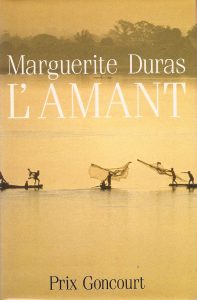
- Related:
- Book Reviews


